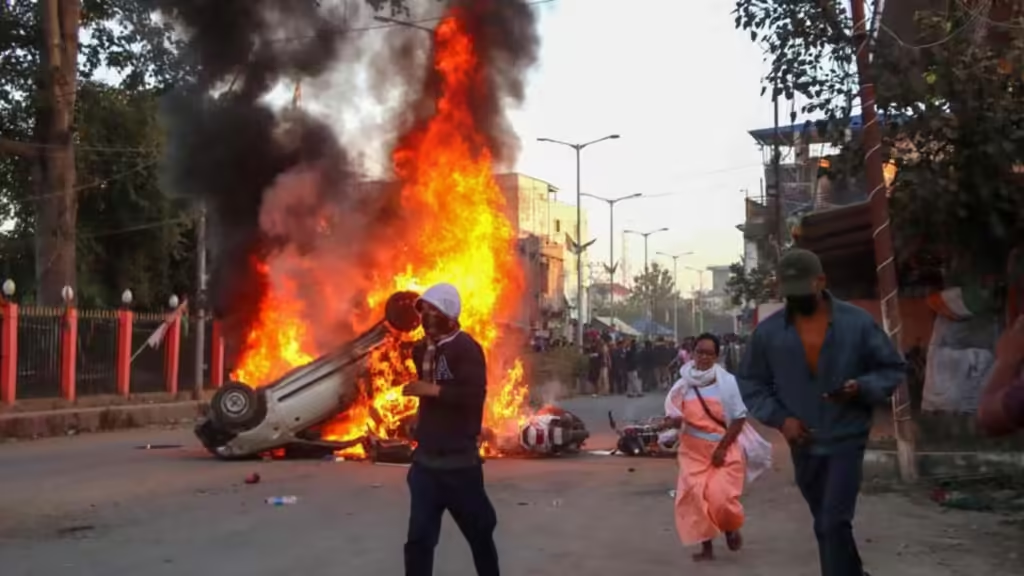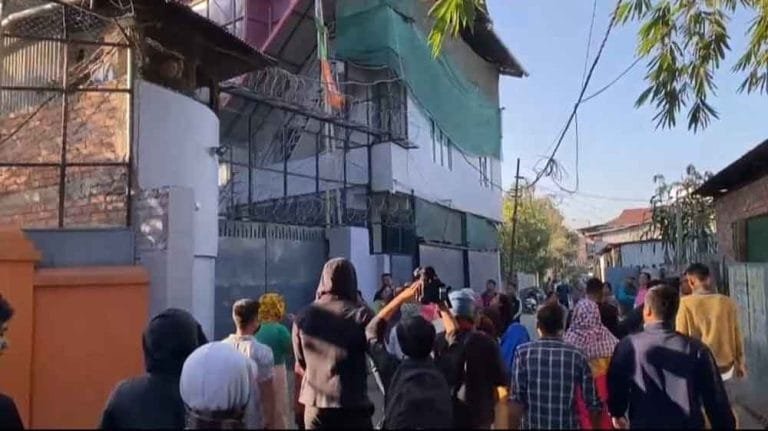The Highlights:
A wave of escalating turmoil is sweeping through northeast Indian state Manipur as two fresh violent incidents happened in Jiribam district and six civilian bodies were found as protests reached a new high and political temperatures soared.
Crisis in Jiribam
On November 15, 2024, Jiribam district, about 220 km from the state capital Imphal, turned into the epicentre of ethnic violence. Multiple houses and government offices-cum-police outposts, including two police outposts, and a forest beat office-cum-residential quarters were set ablaze by armed mobs allegedly triggered by the killing of a 59-year-old man identified as Soibam Saratkumar Singh, whom the locals alleged was killed by militants from another community. Retaliating, locals torched properties belonging to the suspected community, further escalating tensions in Imphal.

Mass Protests in Imphal
These murmurs in Jiribam have been echoed across the state, and then culminated into mass protests in Imphal and other valley districts. Things only became worse when six civilian bodies surfaced on November 15 – who have been missing since November 11 and who were suspected to have been kidnapped by Kuki militants. There was a demand that justice be done as quickly as possible. Protesters stormed the residences of ministers and MLAs, blocked arterial roads, and brought businesses to a halt in key areas, including Khwairamband Ima Keithel (Mother’s Market).

Political Response and Summoning of MLAs
In response to the latest flare-up, Chief Minister N. Biren Singh called an emergency meeting, summoning all legislators of the state to Imphal. In a cabinet meeting convened under the chairmanship of the Chief Minister, the killings were condemned with a decision to declare any organization or groups involved in murders of civilians as unlawful. The government ensured the public that swift action would be taken against the culprits and measures would be taken so that further flare-ups would not take place.
Security Measures and Curfews
The administration has imposed curfew in the affected areas like Jiribam and parts of Imphal to control the situation. The government had also enhanced the security forces to maintain law and order. In fact, the state government had already asked the police department and other related authorities to submit reports regarding the incidents that took place in Jiribam for stringent actions to prevent further intensification.
Public Reaction and Demands for Peace
This new spate of incidents has caused public alarm. Different civil society organizations and local leaders asked for restraint while appealing to the government to come out with decisive action to restore peace. The Chief Minister appealed to all communities to maintain harmony and cooperate with the authorities in bringing the perpetrators of violative acts to justice.
Historical Background of Ethnic Tensions
Manipur has a history of ethnic tension, mainly between the Meitei community in the Imphal Valley and tribes throughout the hill districts, for example, Kukis and Nagas. The Jiribam violence, which is a district inhabited by people from other ethnic groups, has proved to be a test case for the inter-community relations in the state. For such a critical point in this area, how the government responds to the situation is important since it will set an example on how such ethnic conflict will be addressed in the region.
Impact on Day-to-Day Life and Economy
The current chaos has completely upset day-to-day life in Manipur. The schools have been closed down, businesses depressed, and local commercial activities badly affected by the shutdowns and curfews. The blockade of National Highway 37, a lifeline connecting Imphal with Assam, had led to a shortage of essential commodities, making the situation even more challenging.
International Focus and Human Rights Issues
The episode has attracted international attention. Human rights bodies have expressed anguish over the use of force which caused casualties and damaged properties. Appeals for impartial inquiries into the happenings and accountability on the part of the perpetrators have been made. The state government has assured steps to vindicate human rights and normalcy restored.
Way Ahead: Discussion and Reconciliation
To ensure lasting peace in Manipur, it needs to engage community leaders, provide equitable development, and engender mutual respect between different ethnic groups. With this, once the roots of the problematic situation of ethnic tension are addressed through dialogue and reconciliation, all the concerned parties can rest assured that the future in Manipur will be stabilized.
Conclusion
The recent spates of violence in Manipur-the violent attacks staged in Jiribam and those in Imphal-seem to call for effective governance and community engagement in response to devious, underlying ethnic tensions. Given that such challenges keep flooding the state, restoration of peace cannot be at the expense of justice for the victims, and certainly not to the detriment of an environment for all communities to coexist in harmony.
For Latest News Updates Click Here
